
Coming out of the closet, often shortened to coming out, is a metaphor used to describe LGBT people's self-disclosure of their sexual orientation, romantic orientation or gender identity.

LGBT culture is a culture shared by lesbian, gay, bisexual, transgender, and queer individuals. It is sometimes referred to as queer culture, while the term gay culture may be used to mean either "LGBT culture" or homosexual culture specifically.

Affirmation: LGBTQ Mormons, Families, & Friends is an international organization for individuals who identify as gay, lesbian, transgender, bisexual, queer, intersex, or same-sex attracted, and their family members, friends, and church leaders who are members or former members of the Church of Jesus Christ of Latter-day Saints.
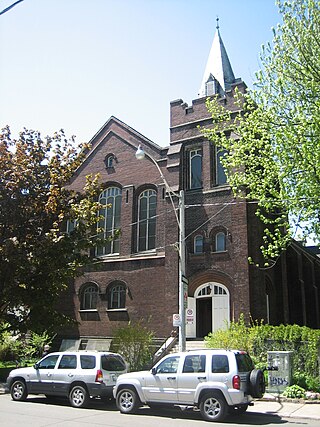
The Metropolitan Community Church of Toronto is a congregation of the worldwide Metropolitan Community Church movement located in Toronto, Ontario, Canada and is a welcoming congregation openly affirming lesbian, gay, bisexual, heterosexual and transgender people. MCC Toronto was instrumental in changing the law on same sex marriage in Ontario, when two same-sex marriage ceremonies performed at the church on January 14, 2001 initiated the process leading to the Halpern v Canada (AG) decision of 2003.
Darlene Onita Garner is an American minister and LGBT activist, and a co-founder of the National Coalition of Black Lesbians and Gays (NCBLG). She was the first African-American elder in the Metropolitan Community Church and she helped create the denomination's biannual Conference for People of African Descent (PAD). In 2008 and 2009, she served as MCC Vice-Moderator. She is a nationally recognized speaker on LGBT religious issues; for instance, she was invited to join several other nationally known speakers to announce the "American Prayer Hour", a gay-affirming alternative to the "National Prayer Breakfast". For her work in the LGBT community, Garner was credited in The African American Almanac as "contributing to the visible image of gays in society" and in 2010 was named a "Capital Pride Hero" by Capital Pride.
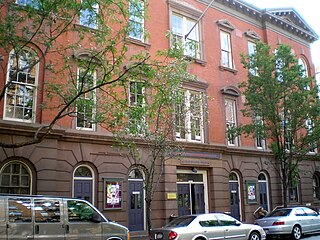
The Lesbian, Gay, Bisexual & Transgender Community Center, commonly called The Center, is a nonprofit organization serving the lesbian, gay, bisexual and transgender (LGBT) population of New York City and nearby communities.
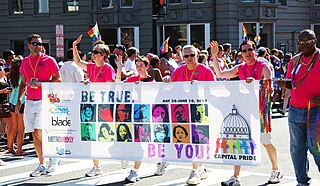
Capital Pride is an annual LGBT pride festival held in early June each year in Washington, D.C. It was founded as Gay Pride Day, a one-day block party and street festival, in 1975. In 1980 the P Street Festival Committee formed to take over planning. It changed its name to Gay and Lesbian Pride Day in 1981. In 1991, the event moved to the week prior to Father's Day. Financial difficulties led a new organization, One In Ten, to take over planning of the festival. Whitman-Walker Clinic (WWC) joined One In Ten as co-sponsor of the event in 1997, at which time the event's name was changed to Capital Pride. Whitman-Walker became the sole sponsor in 2000. But the healthcare organization came under significant financial pressures, and in 2008 turned over producing duties to a new organization, Capital Pride Alliance.
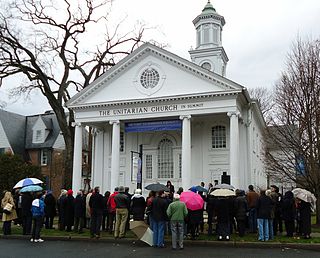
Unitarian Universalism, as practiced by the Unitarian Universalist Association (UUA), and the Canadian Unitarian Council (CUC), is a non-Creedal and Liberal theological tradition and an LGBTQ affirming denomination.

Lesbian, gay, bisexual and transgender people (LGBT) in the Philippines face some legal challenges not faced by non-LGBT people, with numerous anti-discrimination legislations, bills and laws that are struggling to be passed on a national level to protect LGBT rights nationwide, with some parts of the country only existing on a local government level. LGBT individuals in the Philippines are often faced with disadvantages and difficulties in acquiring equal rights within the country. They also have a higher rate of suicide and suicide ideation compared to their heterosexual counterparts.

The lesbian, gay, bisexual, transgender and queer (LGBTQ) people in the Philippines have a distinctive culture in society, and also have limited legal rights. Gays and lesbians are more tolerated than accepted in Filipino society. Despite recent events that have promoted the rights, general acceptance, and empowerment of the Filipino LGBT community, discrimination remains. Homosexuals in the Philippines are known as "bakla", though there are other terms to describe them. According to the 2002 Young Adult Fertility and Sexuality Survey, 11 percent of sexually active Filipinos between the ages of 15 and 24 have had sex with someone of the same sex. According to Filipino poet and critic Lilia Quindoza Santiago, Filipino culture may have a more flexible concept of gender. Kasarian is defined in less binary terms than the English word; kasarian means "kind, species, or genus".
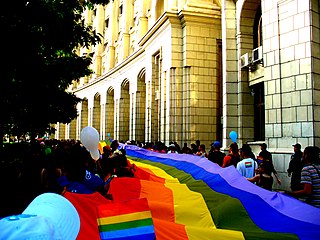
Bucharest Pride, known previously as GayFest, is the annual festival dedicated to LGBT rights in Romania, taking place in Bucharest for nearly a week. Current event organizer is Kyle David Kipp. It first took place in 2004 and now occurs in May–June of each year, culminating with the March of Diversity. It is organised by the non-profit organisation ACCEPT, the country's largest lesbian, gay, bisexual and transgender (LGBT) rights organisation. The festival also receives funding from the Romanian Ministry of Health and the National Council for Combating Discrimination, as well as a number of private organisations, such as the Open Society Institute and the British Council in Romania.

Amsterdam Pride, Amsterdam Gay Pride or Pride Amsterdam is a citywide queer-festival held annually at the center of Amsterdam during the first weekend of August. The festival attracts several hundred-thousand visitors each year and is one of the largest publicly held annual events in the Netherlands.
St. John's Metropolitan Community Church is a Christian church ministering to the LGBT population in Raleigh, North Carolina, United States. The church is a member congregation of the Metropolitan Community Church (MCC), a worldwide fellowship of LGBT-affirming churches. St. John's is also affiliated with the North Carolina Council of Churches and the Raleigh Religious Network for Lesbian and Gay Equality (RRNLGE). The church is located at 4 N Blount street in downtown Raleigh.
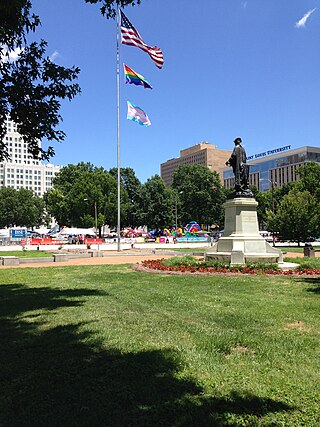
PrideFest St. Louis is an annual LGBT pride event in St. Louis, Missouri. The event is organized by Pride St. Louis, an LGBT non-profit organization in the Greater St. Louis area.

Seattle Pride refers to a series of events which are held annually throughout the month of June to celebrate LGBT Pride in Seattle, Washington. Seattle Pride also refers to the nonprofit organization Seattle Out and Proud which coordinates and promotes LGBTQIA+ events and programs in Seattle year-round including the Seattle Pride Parade.

New York City has been described as the gay capital of the world and the central node of the LGBTQ+ sociopolitical ecosystem, and is home to one of the world's largest LGBTQ populations and the most prominent. Brian Silverman, the author of Frommer's New York City from $90 a Day, wrote the city has "one of the world's largest, loudest, and most powerful LGBT communities", and "Gay and lesbian culture is as much a part of New York's basic identity as yellow cabs, high-rise buildings, and Broadway theatre". LGBT travel guide Queer in the World states, "The fabulosity of Gay New York is unrivaled on Earth, and queer culture seeps into every corner of its five boroughs". LGBT advocate and entertainer Madonna stated metaphorically, "Anyways, not only is New York City the best place in the world because of the queer people here. Let me tell you something, if you can make it here, then you must be queer."
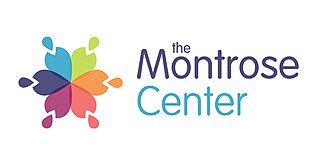
The Montrose Center is an LGBTQ community center located in Houston, Texas, in the United States. The organization provides an array of programs and services for the LGBTQ community, including mental and behavioral health, anti-violence services, support groups, specialized services for youth, seniors, and those living with HIV, community meeting space, and it now operates the nation's largest LGBTQ-affirming, affordable, senior living center in the nation, the Law Harrington Senior Living Center. It is a member of the National Coalition of Anti-Violence Programs. It is in Neartown (Montrose).
LGBT culture in St. Louis is strongly influenced by larger regional divisions, such as racial division and the city/county divide. Recorded history and resource flow have tended to prioritize white individuals and the city's central corridor, creating a perception of LGBT culture in St. Louis that does not always align with regional demographics. For the purposes of this article, St. Louis describes the metropolitan area, including neighboring counties in Missouri and Illinois.
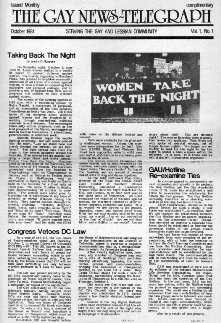
The Gay News-Telegraph was an American LGBT newspaper that ran from 1981 to 2000. It was published by Piasa Publishing, in St. Louis, Missouri. By 1992, the name had changed to The Lesbian and Gay News-Telegraph. In 1994, The New York Times reported their circulation at 14,000 copies, and in 1995, the St. Louis Post - Dispatch said it had been reaching "40,000 readers". It was distributed in six states. Their last issue was published on January 14, 2000.














